Media Highlights 2016
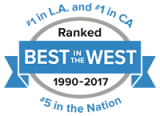
Ranked #5 in the nation
UCLA gastroenterology and GI surgery ranked to No. 5 in the nation, according to a U.S.News & World Report survey that reviewed patient-outcomes data, reputation among physicians and other care-related factors. This makes us, once again, Best in the West! In addition, UCLA Health's hospitals in Westwood and Santa Monica have been named to U.S.News & World Report's 2016-17 Best Hospitals Honor Roll. UCLA Health ranking
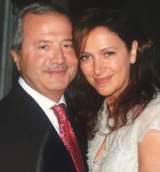
$30 million gift to UCLA Health Sciences will accelerate research, education and patient care
Tamar and Vatche Manoukian have made a landmark gift to the Division of Digestive Diseases at the David Geffen School of Medicine at UCLA that will provide unrestricted funds to accelerate research, innovative clinical care and educational priorities. This generous effort has inspired additional anonymous pledged support, bringing the total of the gift on behalf of the Manoukians to $30 million to benefit the division and support crucial initiatives in the Geffen School of Medicine.
In recognition of the Manoukians' leadership philanthropy, the university will name the division in their honor - making this the medical school's first division to be named following a philanthropic gift. In addition to the UCLA Vatche and Tamar Manoukian Division of Digestive Diseases, the university has named 100 UCLA Medical Plaza the Vatche and Tamar Manoukian Medical Building.
"The science that will emerge from the Manoukians' extraordinary contribution will lead to the discovery of new drugs and therapies that will improve health and save lives," said UCLA Chancellor Gene Block. "Their generosity is an inspiration to our talented physicians and to other members of the philanthropic community."
The UCLA Division of Digestive Diseases is renowned for its comprehensive research. Ranked No. 5 in the nation by the U.S. News & World Report 2016-17 survey, the division has become a model for coordinated care.
"Visionary philanthropy can alter the course of science," said Dr. John Mazziotta, vice chancellor for UCLA Health Sciences and CEO of UCLA Health. "The remarkable generosity of Tamar and Vatche Manoukian will be instrumental in positioning the division for the future."
Building on an interdisciplinary and collaborative clinical approach and bolstered by pioneering laboratory science, division physicians provide the tools for patients to manage chronic disease, the technologies to save lives and the therapies to ensure cures for some of the most challenging conditions.
"Innovation requires both leadership and investment," said Dr. Eric Esrailian, Co-Chief of the Division of Digestive Diseases and Lincy Foundation Chair in Clinical Gastroenterology in the Geffen School of Medicine. "Tamar and Vatche's exceptional philanthropy will help ensure that UCLA can continue unraveling the mysteries of digestive diseases, make transformative scientific discoveries, and develop the physician leaders of the future. Their unrestricted gift gives the division flexibility that is essential as we advance our highest educational, research and patient care priorities."
A leader in the global Armenian community, Vatche Manoukian has been involved in a wide range of businesses, including property investment, retail, pharmaceuticals, biotechnology, entertainment and renewable energy. He and his wife, who have four children, have continued his family's tradition of charitable work throughout the world, with a particular emphasis on education, medicine, culture, the environment and Armenian causes.
The Manoukians' scholarship funds have enabled several thousand students who lack financial resources to further their education, and postgraduate programs established by the Manoukians at universities in the United States, the United Kingdom and Lebanon have helped provide essential skills for tomorrow's community leaders.
The couple support many children's charities around the world, such as the National Society for the Prevention of Cruelty to Children; the U.S. Fund for UNICEF, on whose board Manoukian serves; and the Prince Albert II of Monaco Foundation. They also support the Royal Opera House in London. The Manoukians have been the sole financial supporters of major cultural exhibitions, such as the "Treasures of the Ark" exhibition held at the British Library to commemorate 1,700 years of Armenian Christianity.
"Tamar and I believe that philanthropy can shape the future," Manoukian said. "It is our hope that our gift will not only change medical science, but also be a model for others. We hope that young people will be inspired to give and will become engaged with causes that matter."
This significant investment in the division of digestive diseases will provide vital funding for pioneering investigations that will lead to novel therapies, more comprehensive patient care, faculty support to attract top scientists and clinicians, and the education of aspiring doctors and researchers.
"This gift is especially meaningful to us as a public university," Esrailian said. "This investment will help fuel additional discoveries of the kind that have already earned UCLA the reputation as a world leader in research, patient care and medical education."
The gift is part of the $4.2 billion UCLA Centennial Campaign, which is scheduled to conclude in December 2019 during UCLA's 100th anniversary year.
11 stomach issues that can actually be a bigger deal than you think
Dr. Carl Nordstrom, clinical instructor of medicine in the Vatche and Tamar Manoukian Division of Digestive Diseases at the David Geffen School of Medicine at UCLA, commented Dec. 27 in a Bustle article on signs that stomach discomfort could be a bigger issue.
How germs, dirt and hookworms can boost your health - Can we be too clean?
Dr. Jonathan P. Jacobs, clinical instructor of medicine in the Vatche and Tamar Manoukian Division of Digestive Diseases at the David Geffen School of Medicine at UCLA, commented Dec. 27 in a U.S. News & World Report article about intestinal worms and human diseases.
It feels like stress is killing you - That's because it might be
Dr. Emeran A. Mayer, director of the G. Oppenheimer Center for Neurobiology of Stress and Resilience at UCLA and co-director of the CURE: Digestive Diseases Research Center, was quoted Dec. 20 in a True Viral News story on how the connection between the brain and the digestive tract plays a role in stress.
The truth about the gluten-free diet
Nancee Jaffe, MS, RDN, UCLA Digestive Health and Nutrition Clinic, was quoted in the December 1, 2016 Men's Health article on whether the gluten-free diet can benefit those without celiac disease.
Probiotics in yogurt and hot it affects the brain
A study conducted by the G. Oppenheimer Center for Neurobiology of Stress and Resilience (CNSR) on how probiotics in yogurt affect brain function was referenced Dec. 1 in a Psychology Today story on mental illness. It was also referenced Nov. 23 in a Sustainable Food Trust story about the gut, Dec. 5 on Resilience.org, referenced Dec. 16 in ProHealth and Dec. 20 in Health Nut News in stories about boosting brain health.
UCLA research recognized as one of the most highly cite papers 2014/2015
Kirsten Tillisch, MD, chief of integrative medicine at GLA VHA and associate professor of medicine at UCLA Vatche and Tamar Manoukian Division of Digestive Diseases, was notified by the editors of Gastroenterology that the paper, Consumption of Fermented Milk Product with Probiotic Modulates Brain Activity, published in 2013, is one of the most highly cited papers during 2014 and 2015. Dr. Tillisch was the first author and PI of the study. Available on PubMed
How probiotics impact our mental health
Dr. Kirsten Tillisch, an associate professor of medicine in the division of digestive diseases at the G. Oppenheimer Center for Neurobiology of Stress and Resilience (CNSR), was featured Nov. 5 in an NBC Nightly News segment on the health impact of probiotics. Dr. Tillisch discussed her research on how probiotics found in yogurt can impact our gut health as well as what's going on in the brain. Learn more on the CNSR website
A conversation with Dr. Sammy Saab
The November issue of Healio: HCV Next featured a Q&A with Dr. Sammy Saab, professor of medicine and surgery and head of outcomes research in hepatology at the David Geffen School of Medicine at UCLA, highlighting his achievements, influences and interests in hepatology research.
Gut bacteria's impact on brain function
Research from the G. Oppenheimer Center for Neurobiology of Stress and Resilience and the Ahmanson-Lovelace Brain Mapping Center at UCLA on gut bacteria's impact on brain function was referenced Oct. 27 in a She Said story.
David Geffen School of Medicine receives $30 million gift to advance research and care
Tamar and Vatche Manoukian have made a landmark pledge to the UCLA Division of Digestive Diseases that has inspired additional anonymous pledged support, bringing the total of the gift to $30 million. The gift will accelerate research, innovative clinical care and educational priorities. The donation was covered Oct. 14 in Chronicle of Philanthropy, Massis Weekly, Asbarez Newspaper and DOTmed. The donation was also reported Oct. 22 in Philanthropy News Digest.
Dennis Jensen, MD and V. Raman Muthusamy, MD, named Healio Gastroenterology 200 Innovators in Gastroenterology and Hepatology
The editors and publisher of Healio Gastroenterology compiled the inaugural Healio Gastroenterology 200, a list of gastroenterology and hepatology professionals we identified as leading innovators across the specialties from inflammatory bowel disease to endoscopy, from hepatitis C virus to esophageal disease. The list is a compilation of physicians who either work to educate their colleagues; conduct research into new and novel technologies to advance the profession; or innovate the unique aspects of gastroenterology and hepatology. View full list
Food companies using new findings about the gut brain biome to inform their product strategy
Dr. Emeran A. Mayer, director of the G. Oppenheimer Family Center for Neurobiology of Stress and Resilience and co-director of the CURE: Digestive Diseases Research Center, was quoted Sept. 29 in a Medical Daily story and Sept. 30 in an MSN story on the enteric nervous system as the body's "second brain." He additionally commented Sept. 30 in a Reuters story about how food companies are using new findings about the gut biome to inform their product strategy; that story was picked up Sept. 30 by the U.K.'s Daily Mail, Yahoo! News, and Lifescript, and Oct. 3 by Medscape, among other placements.
Outbreak of hepatitis A
Dr. Sammy Saab, professor of medicine and surgery and head of outcomes research in hepatology at the David Geffen School of Medicine, commented Sept. 2 in a Today.com story about an outbreak of hepatitis A and the symptoms of those affected.
Rising Stars 2016
Congratulations to Drs. Gina Choi, Lynn Shapiro Connolly, Kevin Ghassemi, Christina Ha, Wendy Ho and Rabindra R. Watson on their selection as Super Doctors Rising Stars 2016. The selection process for Super Doctors is a rigorous multi-step process designed to identify physicians who have attained a high degree of peer recognition and professional achievement. Physicians are asked to consider the following question: "If you needed medical care in one of the following specialties, which doctor would you choose?" While approximately 5 percent of the physicians within the respective state or region are named to Super Doctors, no more than 2.5 percent are named to the Rising Stars list.
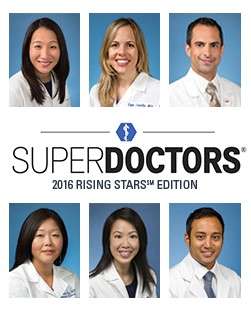
Top (left to right) Gina Choi, MD, Lynn Shapiro Connolly, MD, MSCR, Kevin Ghassemi, MD
Bottom (left to right) Christina Ha, MD, Wendy Ho, MD, Rabindra R. Watson, MD
FODMAP diet
Nancee Jaffe, MS, RDN, registered dietitian at the Digestive Health and Nutrition Clinic, was quoted Aug. 23 in a Women's Health story about the low FODMAP diet and its use in preventing bloating.
A healthy gut can make you happier
Kirsten Tillisch, MD, an associate professor of medicine in the division of digestive diseases at UCLA's David Geffen School of Medicine, was quoted August 1 in a LiveStrong article on how a healthy gut can make you happier.
Dr. V. Raman Muthusamy elected ACG Governor
Dr. Muthusamy, director of interventional and general GI endoscopy, was elected American College of Gastroenterology (ACG) governor for the region of Southern California A. His three-year term begins after the annual meeting in October 2016.
Unusual bowel issues may be linked to pancreatic insufficiency
Stephen Kim, MD, interventional endoscopy, was featured July 22 in Everyday Health, about the importance of having a frank discussion with your doctor about unusual bowel issues that may be linked to pancreatic insufficiency.
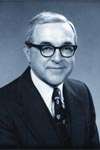
Remembering Dr. Sherman Mellinkoff
It is with deep sadness that we inform you that Dr. Sherman Mellinkoff, an iconic figure in UCLA history, has died. Dr. Mellinkoff was 96 years old and passed away on Sunday, July 17.
Dr. Mellinkoff served as the second dean of the UCLA School of Medicine, and it was under his 24 years of leadership - among the longest tenures of any medical school dean - that our fledgling school was transformed into a great academic institution recognized internationally for medical education, groundbreaking research and exceptional patient care.
Dr. Mellinkoff was a brilliant visionary and an extraordinary leader who was anointed "Dean of Deans" by his peers while chair of the Association of American Medical Colleges' Council of Deans. Under his guidance, the school grew from 28 students to 650; its faculty quadrupled; its budget increased by $165 million; and multiple organ-transplantation programs, a comprehensive cancer center and one of the first federally funded facilities for positron emission tomography research were established.
We remember Dr. Mellinkoff not only for his remarkable achievements as a Dean, but also for his warmth, deep-seated integrity and self-deprecating humor. "Sherm," as his friends called him, was a man of great culture. Sherm loved literature, and it was not unheard of for him to quote both the humorist James Thurber and Ecclesiastes in the same sentence. An avid fan of history and baseball, he peppered his speech with passages from Winston Churchill and pitcher Nolan Ryan.
Although we mourn Dr. Mellinkoff's passing, we also celebrate his life as a quintessential physician who cared as deeply for our school as he did for his patients. A memorial service is being planned to honor this inspirational leader, our teacher, colleague and friend.
Los Angeles Times spotlights "Mind-Gut Connection"
Emeran A. Mayer, MD and his new book, "The Mind-Gut Connection," were featured July 8 in a Los Angeles Times Q&A. Dr. Mayer, director of the G. Oppenheimer Center for Neurobiology of Stress and Resilience at UCLA and co-director of CURE: Digestive Diseases Research Center, explains how trillions of microbes living in our intestines have a running dialogue between the brain and gut that play a role in our stress levels, sickness and recovery. The article was also picked up by the Centre Daily Times July 9 and Sci-Tech Today July 11, and an excerpt from his book was published July 5 in mind bodygreen.
Traffic light idea for restaurant menus
Dr. Lin Chang, professor of medicine and director of the Digestive Health and Nutrition Clinic, was quoted June 21 on the NBC Today Show website regarding a study that found that implementing a simple three-color coding scheme on restaurant menus, including red for fattening foods, led to a 60-calorie drop in what people ordered. Dr. Chang liked the "traffic light" idea, but cautioned limiting food from one meal may give people the urge to calorie splurge with other food items later on.
What is FODMAP?
Dr. Eric Esrailian, co-chief of the UCLA Division of Digestive Diseases at the David Geffen School of Medicine at UCLA, was quoted May 27 in a Self.com explaining that "FODMAP" is actually an acronym for "fermentable oligosaccharides, disaccharides, monosaccharides, and polyols."
Gut microbes may play a role in obesity, cancer, anxiety and depression
Dr. Kirsten Tillisch, associate professor of medicine in the division of digestive diseases, was quoted May 12 in Self.com about the natural microbes in our gut and how they may play a role in such diseases and conditions as obesity, cancer, anxiety and depression.
Available treatment options for people with mild IBS
Dr. Lin Chang, professor of medicine and director of the Digestive Health and Nutrition Clinic, was quoted May 2 in the Wall Street Journal about the variety of treatments available for people with a mild form of irritable bowel syndrome, which involves chronic diarrhea, constipation or both, along with abdominal cramping.
Santa Clarita GI specialist answers burning questions
Santa Clarita Magazine's April edition published a guest column by Dr. Vikas Pabby, assistant clinical professor and digestive-diseases specialist with UCLA Health's Santa Clarita practice, about gastroesophageal reflux disease or GERD.
Eight UCLA Digestive Disease physicians voted Best Doctors in America for 2015-16
Best Doctors conducts an exhaustive, peer-reviewed survey of the medical profession, polling more than 50,000 doctors across the country. Doctors are asked to provide an assessment of the clinical abilities of their peers within each of the more than 400 subspecialties of medicine. The millions of individual data points collected through this process, after being compiled through algorithms that correct for statistical bias, yields the list of those physicians deemed "best" by their peers. Continuous peer-to-peer surveys help identify specialists who are considered by fellow physicians to be the most skilled in their fields and most qualified for reviewing and treating complex medical conditions.
Only 5% of the doctors in any country are actually selected to become Best Doctors. Best Doctors has earned a worldwide reputation for reliable, impartial results by remaining totally independent. Doctors are not paid to complete the survey, and cannot pay to be included in the database.
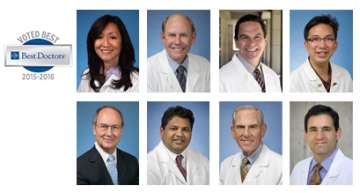
Top: Left-Right: Lin Chang, MD, Jeffrey L. Conklin, MD, Francisco Durazo, MD, Steven-Huy Han, MD. Bottom: Left-Right: Dennis M. Jensen, MD, V. Raman Muthusamy, MD, Bennett E. Roth, MD, and Sammy Saab, MD, MPH
Voted Southern California Super Doctors 2016
A peer-review selection process ensures that only the top physicians are selected to become Super Doctors. These doctors have excelled professionally and are widely recognized as leaders within their fields of practice. Every year, thousands of physicians receive ballots that ask: "If you needed medical care, which doctor would you choose?" Several safeguards prevent self-nomination and ballot manipulation. An expert Blue Ribbon Panel groups nominees into more than 30 medical practice areas and assigns point totals based on individual reviews. Each doctor's professional information is verified to ensure it is accurate and up-to-date.
UCLA Health is proud to have such a diverse group of doctors be deemed "super" among their peers. Super Doctors is a respected publication that identifies top doctors through independent research and an objective selection process.
The following UCLA Division of Digestive Diseases physicians were recognized: Peter Anton, MD, Lin Chang, MD, Daniel Cole, MD, MPH, Jeffrey L. Conklin, MD, Francisco Durazo, MD, Eric Esrailian, MD, MPH, Gary Gitnick, MD, Steven-Huy Han, MD, Dennis M. Jensen, MD, Rome Jutabha, MD, Thomas Kovacs, MD, Emeran A. Mayer, MD, Bennett E. Roth, MD, Sammy Saab, MD, MPH and Kirsten Tillisch, MD
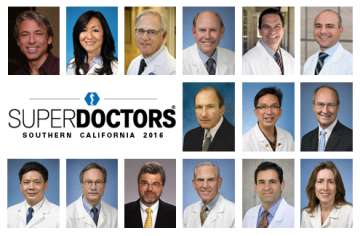
Dr. Emeran A. Mayer is recipient of the American Psychosomatic Society, Paul D. MacLean Award
Paul MacLean was a physician whose visionary neuroscientific research career at Yale Medical School and NIMH was inspired by his recognition of the importance of emotion in clinical medicine and everyday life. In 1949, he hypothesized that psychosomatic disorders arose from impairment in communication between the limbic system and neocortex. This award is intended to honor Dr. MacLean and promote the line of research that he created on emotion, the brain and physical disease. Congratulations to Emeran A. Mayer, MD, director of the G. Oppenheimer Center for Neurobiology of Stress and Resilience.
Christina Vorvis receives award for research on pancreatic cancer
Christina Vorvis, BSc, a member of the Dr. Iliopoulos Laboratory, was awarded a prestigious PhD student award for her research on pancreatic cancer. Her research work and presentation was selected as the best between the PhD candidates in the UCLA Molecular, Cellular and Integrative Physiology (MCIP) PhD program. Christina's research presentation was on "Transcriptomic and CRISPR/Cas9 technologies Reveal FOXA2 as a Tumor Suppressor Gene in Pancreatic Cancer." She received the award during the MCIP PhD program's annual retreat at The Hollywood Roosevelt Hotel on February 20, 2016.
Study shows stress of UCLA program's method of training physician-scientist
UCLA's Specialty Training and Advanced Research (STAR) Program recently published a paper in the February issue of Journal of Graduate Medical Education that tracks all 123 graduates from the first 20 years of the STAR Program (through 2013). The piece demonstrates the success of the program with over 80 percent of graduates conducting research in academic or biotechnology careers and 71 percent with academic appointments. The Division of Digestive Diseases has graduated several of these STAR fellows over the past several years. Read more in the UCLA Newsroom
Dr. Fola May awarded UCLA Health Jonsson Comprehensive Cancer Center seed grant
Fola May, MD, PhD, MPhil, assistant professor of medicine in the division of digestive diseases, was awarded the UCLA Health Jonsson Comprehensive Cancer Center Seed Grant which will help fund the project "A Community-Academic Partnership to Improve Colorectal Cancer Screening in South Los Angeles." She will be working with members of the UCLA Fielding School of Public Health to address colorectal cancer disparities in ethnic minorities. The support allows a collaboration between the To Help Everyone (T.H.E) Health and Wellness Centers and UCLA to improve colorectal cancer screening uptake among Latinos and African-Americans in the South Los Angeles Federally-Qualified Health Center (FQHC or Community Health Center) where screening rates are low.
Dr. Arpana Gupta awarded "K" grant from The National Diabetes and Digestive and Kidney Disease Advisory Council
Arpana Gupta, PhD, Ingestive Behavior and Obesity Program at the G. Oppenheimer Center for Neurobiology of Stress and Resilience, was recently awarded the Research Training Grant (K23) from NIH NIDDK for her research "Role of Inflammatory Processes in Reward Network Alterations in Obesity." This project addresses a comprehensive bio-psychosocial bidirectional brain-immune mechanistic model that characterizes the influence of adverse environment factors on prefrontal inhibitory control of brain signatures in the extended reward network in obese subjects. The proposal will identify brain signatures associated with hedonic related eating behaviors and the role of inflammatory mediators in shaping these brain signatures in obese subjects. Then the feasibility of using a targeted intervention (cognitive behavioral therapy [CBT]) to counteract the hypothesized alterations within the extended reward network in a subgroup of obese subjects with hedonic eating behaviors will be investigated.
Watch a video on the health promoting effects of the Mediterranean diet and olive oil
There is strong epidemiological evidence supporting the health benefits of the Mediterranean diet for the prevention of a variety of diseases, ranging from cardiovascular disease, cancer and even degenerative diseases of the brain. The Mediterranean diet is characterized by a high proportion of fruits, vegetables and nuts, a low proportion of red meat and a near absence of animal fats. In addition to the high fiber and low fat content, an important component of the Mediterranean diet are so called polyphenols or antioxidants contained in olive oil and red wine. Emeran A. Mayer, MD, director of the G. Oppenheimer Center for Neurobiology of Stress and Resilience, has a strong interest in the effect of the Mediterranean diet on the gut microbiome brain interactions in health and disease. He has collaborated with Marco Cavalieri, a well-known producer of extra virgin olive oil in the Marche region of Italy, where olives are harvested from 800 year old trees. Cavalieri and Mayer discussed the topic of olive oil and health at a recent event organized by the Azzura Foundation in West Los Angeles. Watch Olive Oil: Understanding Our Oil From Soil to its Soul
Dr. Emeran A. Mayer featured in the documentary "In Search of Balance"
The documentary, In Search of Balance, looks at our health problems from a new perspective, one based on an understanding of how our health and ultimately our destiny as a species are inextricably intertwined with the natural world. In Search of Balance explores a vision of health, science and nature that recognizes the importance of the interconnections between us, the food we consume, how we produce that food and the natural world at large including the mysterious, invisible world of the human microbiome. Emeran A. Mayer, MD, director of the G. Oppenheimer Center for Neurobiology of Stress and Resilience is featured as an expert in the documentary and functioned as its co-producer. The film has already been screened at a number of national film festivals. Learn more